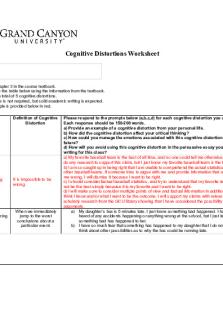Thought Distortions worksheet PDF

| Title | Thought Distortions worksheet |
|---|---|
| Author | Tara Whitmire |
| Course | Social Work Practice with Individuals and Families |
| Institution | The University of Tennessee |
| Pages | 1 |
| File Size | 46.1 KB |
| File Type | |
| Total Downloads | 24 |
| Total Views | 140 |
Summary
From the Beck institute- Testing your thoughts worksheet. You can use the worksheet with clients in clinical therapy. Examples of distorted thoughts....
Description
45
TESTING YOUR THOUGHTS: SIDE ONE WORKSHEET Remember, thoughts may be 100% true, 0% true or somewhere in the middle. JUST BECAUSE YOU THINK SOMETHING, DOESN’T NECESSARILY MEAN IT’S TRUE. 1. When you notice your mood getting worse, or you find yourself engaging in unhelpful behavior, ask yourself the questions on the reverse side of this worksheet and write down the answers. It will probably take about 5-10 minutes. 2. Not all questions apply to all automatic thoughts. 3. If you’d like, you can use the list below to identify cognitive distortions. You may find that more than one distortion applies. 4. Spelling, handwriting and grammar don’t count. 5. It was worth doing this worksheet if your mood improves by 10% or more.
Cognitive Distortions All-or-nothing thinking
Example: “If I’m not a total success, I’m a failure.”
Catastrophizing (fortune telling) Example: “I’ll be so upset, I won’t be able to function at all.” Disqualifying or discounting the positive
Example: “I did that project well, but that doesn’t mean I’m competent; I just got lucky.”
Emotional reasoning
Example: “I know I do a lot of things okay at work, but I still feel like I’m a failure.”
Labeling
Examples: “I’m a loser.” “He’s no good.”
Magnification/minimization
Example: “Getting a mediocre evaluation proves how inadequate I am. Getting high marks doesn’t mean I’m smart.”
Mental filter (selective abstraction)
Example: “Because I got one low rating on my evaluation [which also contained several high ratings], it means I’m doing a lousy job.”
Mind reading
Example: “He’s thinking that I don’t know the first thing about this project.”
Overgeneralization
Example: “Because I felt uncomfortable at the get-together, I don’t have what it takes to make friends.”
Personalization
Example: “The repairman was curt to me because I did something wrong.”
“Should” and “must” statements Example: “It’s terrible that I made a mistake. I should always do my best.” Tunnel vision
“My son’s teacher can’t do anything right. He’s critical and insensitive and lousy at teaching.”
© 2018. Adapted from J. Beck (2020) Cognitive Behavior Therapy: Basics and Beyond, 3rd edition.
Beck Institute for Cognitive Behavior Therapy • One Belmont Ave, Suite 700 • Bala Cynwyd, PA 19004 • beckinstitute.org...
Similar Free PDFs

Thought Distortions worksheet
- 1 Pages

Cognitive Distortions Worksheet
- 3 Pages

Jahn-Teller Distortions
- 6 Pages

German School OF Thought
- 7 Pages

Food For Thought Notes
- 49 Pages

How Language Shapes Thought
- 4 Pages

Skip-thought vectors
- 9 Pages

Thought Paper 3
- 3 Pages

Food for Thought Summary
- 1 Pages

Contribution to Management Thought
- 10 Pages

Schools of thought
- 44 Pages

Kabir - Indian political thought
- 5 Pages

Language Thought and Culture
- 39 Pages
Popular Institutions
- Tinajero National High School - Annex
- Politeknik Caltex Riau
- Yokohama City University
- SGT University
- University of Al-Qadisiyah
- Divine Word College of Vigan
- Techniek College Rotterdam
- Universidade de Santiago
- Universiti Teknologi MARA Cawangan Johor Kampus Pasir Gudang
- Poltekkes Kemenkes Yogyakarta
- Baguio City National High School
- Colegio san marcos
- preparatoria uno
- Centro de Bachillerato Tecnológico Industrial y de Servicios No. 107
- Dalian Maritime University
- Quang Trung Secondary School
- Colegio Tecnológico en Informática
- Corporación Regional de Educación Superior
- Grupo CEDVA
- Dar Al Uloom University
- Centro de Estudios Preuniversitarios de la Universidad Nacional de Ingeniería
- 上智大学
- Aakash International School, Nuna Majara
- San Felipe Neri Catholic School
- Kang Chiao International School - New Taipei City
- Misamis Occidental National High School
- Institución Educativa Escuela Normal Juan Ladrilleros
- Kolehiyo ng Pantukan
- Batanes State College
- Instituto Continental
- Sekolah Menengah Kejuruan Kesehatan Kaltara (Tarakan)
- Colegio de La Inmaculada Concepcion - Cebu


